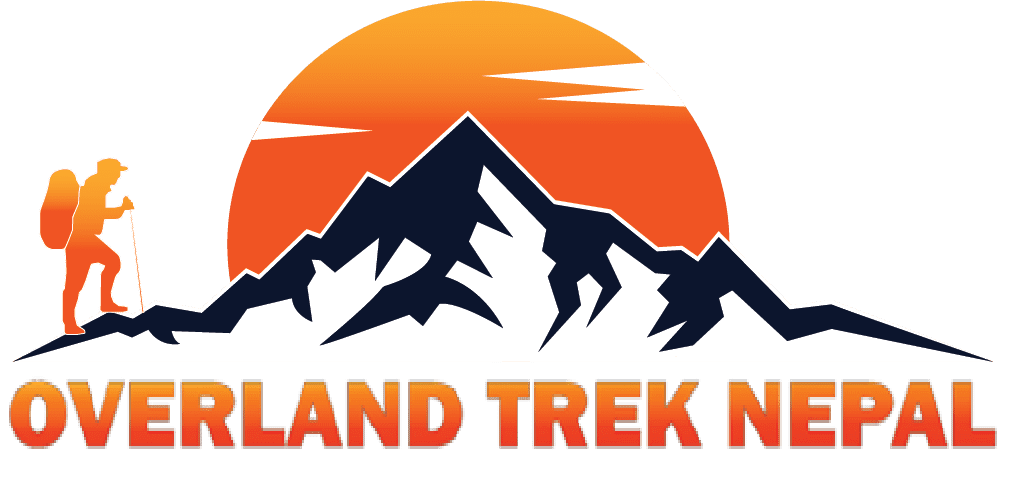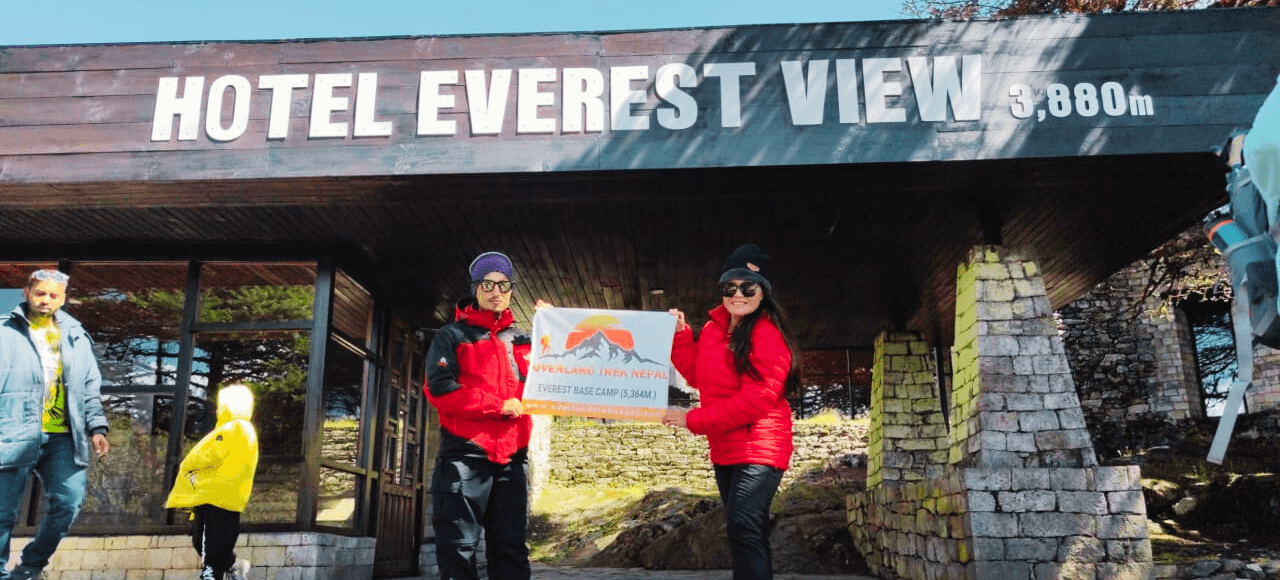Are you planning to do Everest Base Camp Trekking ? and still you are confusing how to get to Everest Base Camp? Read this blog The Best Experienced Trekking Guide to Everest Base Camp Trek with Overland Trek Nepal. Starting on the Everest Base Camp (EBC) Trek is a dream for many adventurers worldwide. With its breathtaking scenery, cultural richness, and the allure of Mount Everest, it’s no wonder this trek is the most demanded in Nepal and globally. This comprehensive guide will explore why the Everest Base Camp Trek has become so popular, how you can undertake this trek independently, what preparations are necessary, and why Overland Trek Nepal stands out as the best choice for your trekking needs.
1. The Most Demanded Trek in Nepal: Everest Base Camp Trek
The Everest Base Camp Trek is renowned for its spectacular views, challenging paths, and cultural experiences. It offers trekkers a once-in-a-lifetime opportunity to stand at the base of Mount Everest’s highest peak. The journey is about reaching the destination and experiencing the stunning landscapes, diverse flora and fauna, and the hospitality of the Sherpa people.
2. How Did Everest Base Camp Trek Become the Most Demanded Trek in the World?
The EBC Trek’s popularity can be attributed to several factors:
Historical Significance: The trek follows the footsteps of Sir Edmund Hillary and Tenzing Norgay, who first summited Everest in 1953.
Natural Beauty: The trek offers panoramic views of some of the world’s highest peaks, including Lhotse, Nuptse, and Ama Dablam.
Cultural Exposure: Trekkers get to explore the unique Sherpa culture, visiting monasteries and traditional villages along the way.
Sense of Achievement: Reaching the base camp of Mount Everest is a monumental achievement for trekkers, offering a sense of fulfillment and adventure.
3. How Can I Trek to Everest Base Camp on My Own? What Preparation Do I Need?
Trekking to Everest Base Camp independently is possible but requires meticulous preparation:
Permits: You need a Sagarmatha National Park Entry Permit and a TIMS (Trekkers’ Information Management System) card.
Fitness: A high level of physical fitness is essential. Cardiovascular and strength training exercises are recommended months before the trek.
Gear: Proper trekking gear, including warm clothing, sturdy boots, and a good backpack, is crucial.
Route Planning: Familiarize yourself with the trekking route, daily stages, and accommodation options.
Acclimatization: Plan for adequate acclimatization days to avoid altitude sickness.
4. How Do I Get to Everest Base Camp?
The typical route to Everest Base Camp involves:
Flight to Lukla: Most trekkers fly from Kathmandu to Lukla, the gateway to the Everest region.
EBC Trek without Flight: Nowadays getting a flight from Lukla and getting back to Kathmandu from Lukla has become very difficult because of that Overland Trek Nepal trekking company provides a unique trekking itinerary to travelers which is not required a flight to get to Everest Base Camp (Everest Base Camp Trek without Flight)
Trekking Route: From Lukla, the trek proceeds through Phakding, Namche Bazaar, Tengboche, Dingboche, Lobuche, and finally to Gorak Shep, before reaching Everest Base Camp.
Return: The return journey follows the same route back to Lukla.
5. What Are the Things I Should Know About Before I Start the Everest Base Camp Trek?
Before starting the trek, consider the following:
Weather Conditions: The best seasons are pre-monsoon (March to May) and post-monsoon (September to November).
Altitude Sickness: Be aware of the symptoms and take preventive measures.
Hydration and Nutrition: Drink plenty of water and consume a balanced diet.
Local Customs: Respect local traditions and customs.
6. What Do You Need for the Everest Base Camp Trek?
Essential items for the trek include:
Clothing: Layered clothing for variable weather conditions, including thermal wear, fleece, and a waterproof jacket.
Footwear: Sturdy, comfortable trekking boots with good ankle support.
Accessories: Trekking poles, a hat, gloves, sunglasses, and sunscreen.
First Aid: Basic first aid kit, including medications for altitude sickness.
Documentation: Necessary permits and identification.
7. How Difficult Is the Everest Base Camp Trek?
The EBC Trek is moderately to highly difficult, depending on your fitness level and experience. The challenges include:
Altitude: The high elevation can cause altitude sickness.
Terrain: Rocky paths, steep ascents, and descents.
Weather: Cold temperatures, especially at night and higher altitudes.
8. What Are the Food Options During the EBC Trek?
Tea houses along the trek offer a variety of food options, such as:
Dal Bhat: A traditional Nepali meal of rice, lentil soup, and vegetables.
Momo: Nepali dumplings filled with vegetables or meat.
Western Dishes: Pasta, noodles, pancakes, and pizza are also available.
Snacks: Energy bars, nuts, and chocolates for quick energy boosts.
9. Planning a Trek to Everest Base Camp: Suggestions on How to Begin and Make It Successful
To ensure a successful trek:
Plan Ahead: Book flights and permits in advance.
Train Regularly: Build your endurance and strength.
Pack Wisely: Bring only essential items to keep your backpack light.
Stay Informed: Keep updated on weather conditions and trail status.
Hire a Guide or Porter: For added safety and to ease the load.
10. How Long Will It Take and What Is the Cost for the Everest Base Camp Trek?
The trek typically takes around 12-14 days, including acclimatization days. The cost varies based on factors such as:
Guided vs. Independent Trek: Guided treks can cost between $1,200 to $2,500, covering permits, accommodation, food, and guide/porter services.
Flights: Round-trip flights from Kathmandu to Lukla cost approximately $350.
Equipment: Renting or buying gear can add to the cost.
11. What Should the Health Conditions Be for Everest Base Camp Trek?
Trekkers should:
Be Physically Fit: Engage in regular cardio and strength training exercises.
Get Medical Check-ups: Ensure no underlying health issues that could be exacerbated by high altitude.
Acclimatize Properly: Follow a slow ascent to prevent altitude sickness.
Stay Hydrated: Drink plenty of fluids to maintain hydration.
12. Overland Trek Nepal: The Best Trekking Company
Overland Trek Nepal stands out among trekking companies for several reasons:
Affordability: Competitive pricing without compromising on quality.
Best Services: Exceptional customer service, knowledgeable guides, and well-planned itineraries.
Experienced Guides: Our guides are experienced, friendly, and well-versed in local culture and terrain.
Comprehensive Management: We handle all logistics, from permits to accommodations, ensuring a hassle-free experience.
Accurate Information: We provide detailed, accurate information to help you prepare and enjoy your trek.
Choosing Overland Trek Nepal ensures a memorable and well-supported journey to Everest Base Camp, making your adventure not only successful but also enjoyable and safe.
In conclusion, the Everest Base Camp Trek is a thrilling and rewarding adventure. With proper preparation, knowledge, and the support of a reputable company like Overland Trek Nepal, you can start on this journey with confidence and make memories that will last a lifetime.

